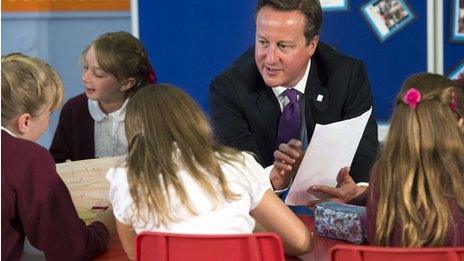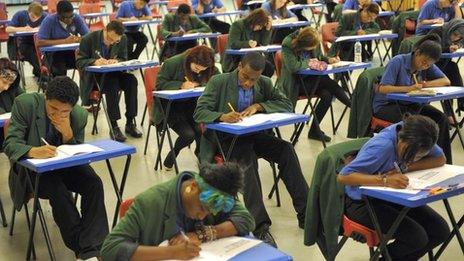Cameron plans rapid intervention for failing schools
- Published
- comments

David Cameron wants a pool of top teachers who can be deployed anywhere
Wider and more rapid powers of intervention to improve failing schools in England are being proposed by the Prime Minister David Cameron.
Regional chiefs would be given stronger powers to make immediate changes in struggling schools.
There will also be a "National Teaching Service" to deploy the best staff to support weaker schools.
Mr Cameron says it will help more young people "reach their potential and succeed in life".
The prime minister says the plans, which would only be realised if the Conservatives when the next general election, would help 100,000 pupils in more than 500 schools currently graded by Ofsted as inadequate.
Wider powers
But the plans angered Russell Hobby, leader of the National Association of Head Teachers, who said "cracking the whip" in this way "may make good politics to some but it makes lousy school improvement".
The Conservative manifesto proposals will give more direct power to the eight regional school commissioners, appointed this year.
These were created to provide a layer of monitoring for academies and free schools, which are no longer supervised by local authorities.
But the Conservatives want the commissioners to be able to intervene in all types of state funded school found by inspectors to be inadequate.
The regional commissioners will be able to impose immediate changes on how schools are run, such as introducing new behaviour policies or installing new school governors.
The Conservatives are also calling for a National Teaching Service, which would help to tackle the problem of schools in challenging areas struggling to recruit high-quality staff.
This could create a central pool of talented teachers, with support and training, who could be deployed where they were most needed.
Under-performing
The teachers would be employed by the service, rather than individual schools, and could be sent to under-performing schools anywhere in England.
"That's what our long-term plan means for you, a decent education system and the chance for your child to get on," said Mr Cameron.
Education Secretary Nicky Morgan said: "We have witnessed a revolution in school standards over the past four years, with more young people being taught in good or outstanding schools today than ever before.
"But there is more to do, and the next phase of the plan must go further and faster in targeting the schools where failure has become ingrained."
Teach First, which has recruited high-achieving graduates to teach in challenging schools, has welcomed the proposal for a National Teaching Service.
James Westhead, executive director, says it supports "any scheme that seems to attract and support talented teachers to those classrooms that will most benefit".
'Demolition'
Brian Lightman, head of the Association of School and College Leaders, also backed the need to recruit the best heads and teachers in the most challenging schools.
He said the proposed National Teaching Service could provide head teachers with the "essential support" of senior staff and "first-rate classroom teachers".
"Nevertheless it is those school leaders, not government, who need to decide what strategies are necessary," said Mr Lightman.
But the announcement on a more rapid intervention in schools was criticised by Russell Hobby of the NAHT who accused the government of having carried out a "demolition of local oversight."
"The announcement is all the more intolerable, because the government's own policies cause more delays to school improvement than any head teacher ever could."
Labour highlighted that it had already announced its own plans for the local supervision of standards, which would apply to all state-funded schools.
"The events in Birmingham have exposed David Cameron's government's failure to deliver effective oversight of our schools. The government's failure has meant school standards suffer," said shadow education secretary Tristram Hunt.
"On the issue of teacher quality, the government has changed the rules to allow unqualified teachers into the classroom."
- Published13 October 2014
- Published7 March 2014

- Published9 July 2014

- Published30 April 2014

- Published24 September 2014
